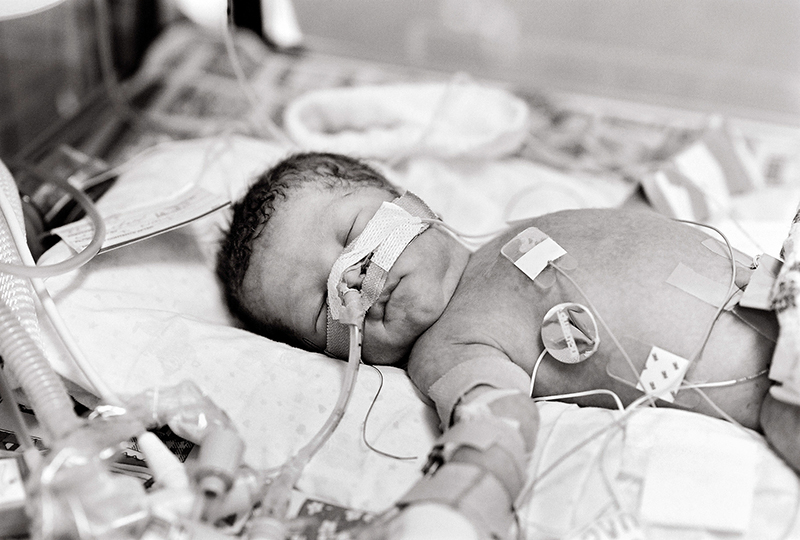
Harris County Takes Action to Combat Prematurity and Support Families During Prematurity Awareness Month
November is Prematurity Awareness Month, a time to bring attention to the challenges that premature births pose to families and communities. In Harris County, the statistics are concerning: in 2022, the preterm birth rate was 12.1%, higher than the national average of 10.4%, with one in every eight babies born prematurely. The impact of preterm birth is not only physical but emotional and financial, as families often face health complications for their infants, as well as the stress of managing healthcare and long-term care.
According to the Centers for Disease Control and Prevention (CDC), preterm birth occurs when a baby is born before 37 weeks of gestation, as opposed to the typical 40 weeks for full-term pregnancies. Premature infants are at greater risk for health challenges, including breathing problems, feeding difficulties, cerebral palsy, developmental delays, vision and hearing issues, and in the most severe cases, infant mortality. In fact, the CDC reports that preterm birth and low birthweight contribute to approximately 14.8% of infant deaths in the U.S. annually.
For those living in Harris County, the statistics on preterm birth and low birthweight are alarming. According to the March of Dimes, the county's preterm birth rate was 12.1% in 2022, with non-Hispanic Black infants experiencing the highest rate of preterm birth at 16.1%. This demographic is also at greater risk for having low birthweight infants, with a rate of 14.1% compared to 6.9% for non-Hispanic White infants. These disparities highlight the urgent need for more comprehensive maternal and infant health interventions.
Harris County Public Health (HCPH) is working to address these challenges by offering resources aimed at preventing preterm births and supporting families through their pregnancy and early parenting journey. One of the most significant initiatives is the Maternal and Child Health Program (MCHP), which provides one-on-one in-home support for up to three years for eligible birthing persons and their families. This program is designed to help reduce health risks and empower families by providing personalized care that supports healthy pregnancies and family growth.
“The emotional and financial toll of premature birth is something that many families in Harris County experience each year,” said Harris County Health Director, Dr. Jacqueline D. Minter. “Our goal is not only to raise awareness about the risks associated with preterm birth, but also to provide tangible resources that can make a real difference in the lives of families and help ensure a healthier future for both parents and their children.”
The HCPH Maternal and Child Health Program aims to reduce health risks and improve outcomes for both mothers and babies. Families can access resources that include prenatal care support, help with navigating healthcare options, and referrals to community services. For those seeking further assistance, the ACCESS Harris County program helps provide coordinated care for community members, offering a holistic approach to improving well-being and self-sufficiency.
Mobile Sidebar Ad
How Can Pregnant Women Reduce the Risk of Premature Birth?
While the causes of preterm birth are not always well understood, pregnant women can take several steps to reduce their risks and improve their health:
- Maintain a healthy weight and lifestyle throughout pregnancy.
- Avoid smoking, alcohol, and drugs, including the misuse of prescription medications.
- Seek prenatal care as early as possible and continue regular check-ups throughout pregnancy.
- Pay attention to signs of early labor, such as contractions, back pain, cramps, or changes in vaginal discharge, and consult a doctor immediately if symptoms occur.
- If a woman has experienced a previous preterm birth, she should discuss additional support and possible interventions with her healthcare provider.
- It's also recommended that there be at least 18 months between pregnancies to reduce the risk of preterm birth.
Taking Action During Prematurity Awareness Month
As part of the observance of World Prematurity Day on November 17, HCPH and community partners are raising awareness about the importance of early prenatal care and the steps families can take to reduce the risks of preterm birth. By educating expectant parents, offering support programs, and making healthcare more accessible, the county aims to create a healthier environment for all families.
"Preterm birth is a serious issue, but with the right support and resources, we can work together to ensure that more babies are born healthy and have the chance to thrive," said Dr. Minter.
To learn more about the Maternal and Child Health Program or to enroll in services, residents can visit the HCPH webpage or call the program directly at (713) 368-MOMS (6667).
With the support of Harris County's public health initiatives, families are empowered with the tools they need to build a strong, healthy foundation for their children. By addressing prematurity with compassion and care, Harris County aims to help reduce health risks and create a brighter future for families in the community.
 Tiffany Krenek has been on the My Neighborhood News team since August 2021. She is passionate about curating and sharing content that enriches the lives of our readers in a personal, meaningful way. A loving mother and wife, Tiffany and her family live in the West Houston/Cypress region.
Tiffany Krenek has been on the My Neighborhood News team since August 2021. She is passionate about curating and sharing content that enriches the lives of our readers in a personal, meaningful way. A loving mother and wife, Tiffany and her family live in the West Houston/Cypress region.

